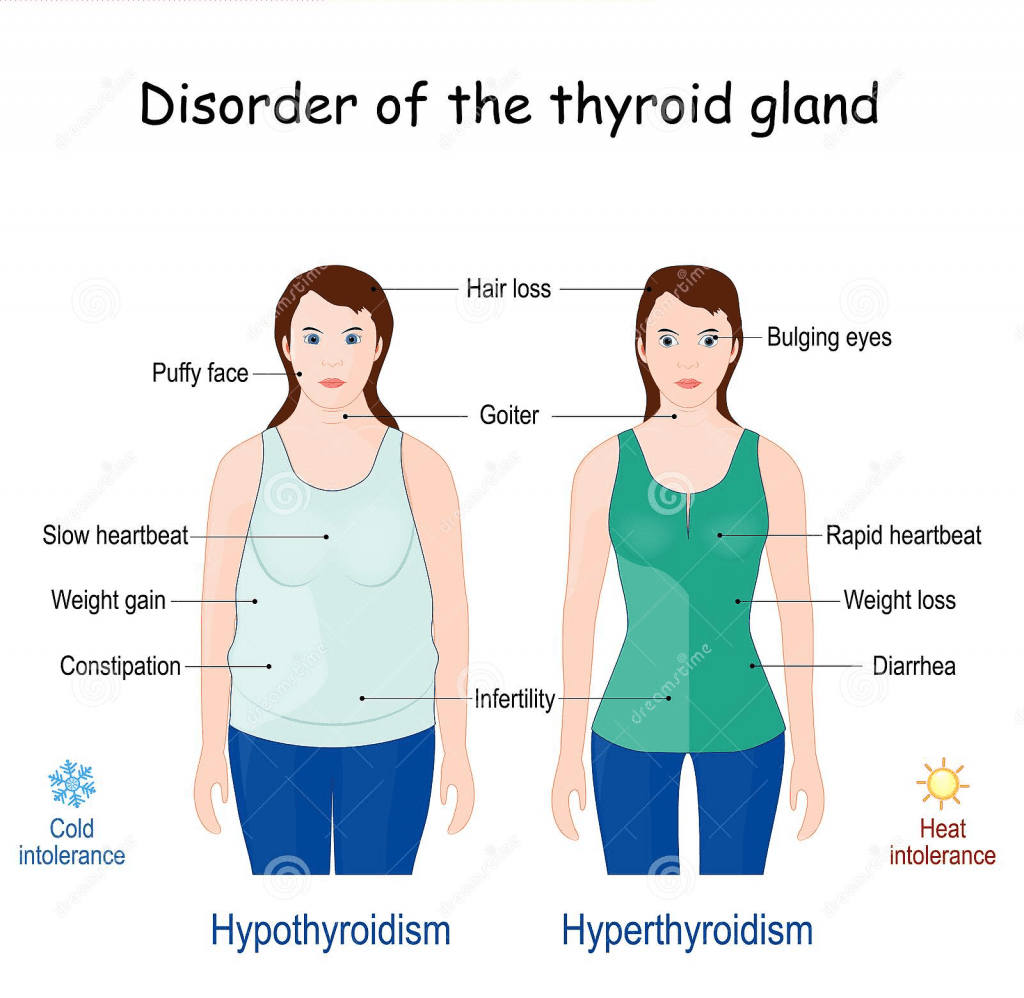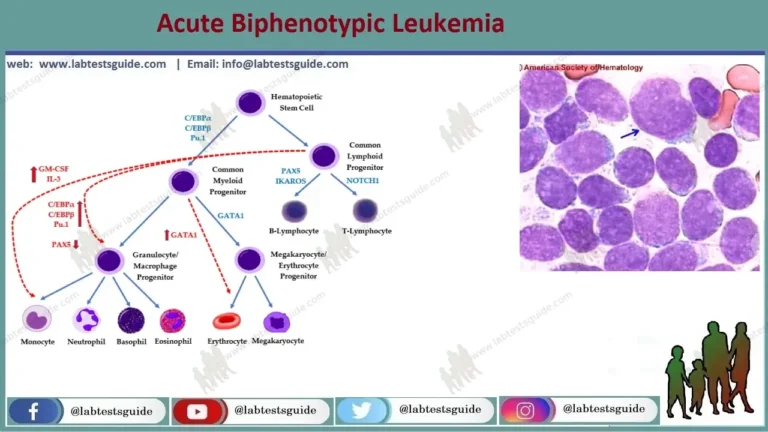Hyperthyroidism, or an overactive thyroid, occurs when the thyroid gland produces more thyroid hormone than your body needs.
Hyperthyroidism, also called an overactive thyroid, is a condition in which the thyroid produces and releases high levels of thyroid hormone. This condition can cause your metabolism to speed up. Symptoms of hyperthyroidism include rapid heartbeat, weight loss, increased appetite, and anxiety. Hyperthyroidism can be treated with antithyroid medications, radioactive iodine, beta blockers, and surgery.

What is Thyroid Gland :
Your thyroid is a small, butterfly-shaped gland in the front of your neck. It produces hormones that control how the body uses energy. These hormones affect almost every organ in your body and control many of your body’s most important functions. For example, they affect breathing, heart rate, weight, digestion, and mood. Without enough thyroid hormones, many of your body’s functions slow down. But there are treatments that can help.
Hypothyroidism vs. Hyperthyroidism

| Hypothyroidism | Hyperthyroidism |
|---|---|
| Gland can’t make enough Hormones | Gland can make Too Much Hormones |
| Slow heartbeat, Weight Gain, Feeling extra cold, | Fast heartbeat, Weight loss, Feeling extra warm |
| Hair loss, Decrease in sweating, | Hair loss, Increase in sweating, |
| Causes symptoms like slowed metabolism | Causes symptoms like Fast metabolism |
 Signs & Symptoms of Hyperthyroidism :
Signs & Symptoms of Hyperthyroidism :
- Hyperthyroidism can significantly accelerate your body’s metabolism, causing :
- Sudden weight loss, even appetite, and food intake remain normal or increase.
- Rapid or irregular heartbeat ( Tachycardia, Palpitation may be more than 100 beats/minutes.).
- The patient may even develop Arrhythmias.
- The patient develops sweating.
- Nervousness or irritability.
- Fatigue
- Muscle weakness
- Trouble tolerating heat
- Trouble sleeping
- Tremor, usually in your hands
- Rapid and irregular heartbeat
- Frequent bowel movements or diarrhea
- Weight loss
- Mood swings
- Goiter, an enlarged thyroid that may cause your neck to look swollen. Sometimes it can cause trouble with breathing or swallowing.
Graves disease This is an autoimmune disorder.
- Grave’s Disease is due to Hyperthyroidism.
- symptoms of hyperthyroidism:
- Tremor, these are usually fine trembling with hands and fingers.
- Patients have increased sensitivity to heat.
- Changes in bowel patterns, especially more frequent bowel movements.
- An enlarged thyroid gland (goiter).
- The patient will have Fatigue, muscle weakness.
- The patient will have sleep difficulty.
- Beta-blockers can mask many of the symptoms of hyperthyroidism
 Causes of Hyperthyroidism:
Causes of Hyperthyroidism:
- Multinodular goiter.
- Single toxic goiter.
- Subacute thyroiditis.
- Autoimmune thyroid disease.
- Pituitary adenoma (thyrotropin producing tumor).
- Gestational trophoblastic tumor.
- Postpartum Thyroid disease.
- Hyperemesis gravidarum.
- Exogenous thyroid hormones.
- Metastatic thyroid cancer.
- iodine-induced.
- Grave’s disease, an autoimmune disorder in which the immune system attacks the thyroid, causing it to produce too much hormone. This is the most common cause.
- Thyroid nodules, which are growths on the thyroid. They are usually benign (not cancerous). But they can become overactive and produce too much thyroid hormone. Thyroid nodules are more common in older adults.
- Thyroiditis, inflammation of the thyroid. It causes stored thyroid hormone to leak out of the thyroid gland.
- Too much iodine. Iodine is found in some medications, cough syrups, algae, and algae-based supplements. Taking too many can cause your thyroid to make too much thyroid hormone.
- Too much thyroid medicine. This can happen if people taking thyroid hormone for hypothyroidism (underactive thyroid) take too much.
 Risk Factors of Hyperthyroidism
Risk Factors of Hyperthyroidism
- Sex. Women are much more likely to have hyperthyroidism than men. Experts believe this may have to do with hormones.
- The pregnancy. Pregnancy can stimulate hyperthyroidism in some people, which can cause complications for both the parents and the fetus.
- Age. You are considered to be at higher risk for hyperthyroidism as an older adult, especially after the age of 60.
- Genetics. A family history of hyperthyroidism generally indicates a higher chance of developing the condition.
- Exposure to iodine. You may get too much iodine from certain medicines or foods.
- Have another health condition. People with type 1 diabetes, primary adrenal insufficiency, or pernicious anemia are considered to be at higher risk.
 Diagnosis of Hyperthyroidism :
Diagnosis of Hyperthyroidism :
When evaluating you for hyperthyroidism, a doctor will collect your personal and family medical history and perform a physical exam. Doctors usually diagnose hyperthyroidism based on symptoms, clinical signs, and laboratory tests.
These Trusted Source diagnostic tests include:
- T4, free T4 and T3 level test. These tests measure the amount of thyroid hormone (T4 and T3) in the blood.
- Thyroid-stimulating hormone (TSH) level test. TSH is a hormone from the pituitary gland that stimulates the thyroid gland to produce hormones. When thyroid hormone levels are high, the pituitary gland responds by decreasing TSH production. An abnormally low TSH can be an early sign of hyperthyroidism.
- Thyroid scan (radioactive iodine uptake scan). This helps your doctor see if your thyroid is overactive by measuring how much iodine it “takes” from your bloodstream. Your doctor will give you a small tablet or liquid amount of iodine. You will then lie on a table while a special camera takes pictures of your thyroid. In particular, a thyroid scan can reveal whether the entire gland or just a single area is causing the problem.
- Thyroid ultrasound. Ultrasounds can measure the size of the entire thyroid gland, as well as any masses on or within it (such as nodules). Doctors can also use ultrasound to determine if a mass is solid or cystic.
- CT scans or MRIs. A CT scan or MRI can show if there is a pituitary tumor.
- While primary care doctors may order some of these tests, it’s best to see an endocrinologist. Endocrinologists specialize in treating and managing hormone-related health conditions.
Preventions of Hypothyroidism :
Some factors that could increase your risk of developing hyperthyroidism may include:
- Having a family history of thyroid disease.
- Having a medical history that includes conditions such as pernicious anemia, type 1 diabetes, and primary adrenal insufficiency (Addison’s disease).
- Having a lot of iodine (a mineral your body uses to make thyroid hormones) in your diet.
- Be pregnant.
 Treatment of Hyperthyroidism:
Treatment of Hyperthyroidism:
There are several treatments for hyperthyroidism. The best approach for you depends on your age, physical condition, the underlying cause of your hyperthyroidism, personal preference, and the severity of your disorder. Possible treatments include:
- Radioactive Iodine. Taken orally, radioactive iodine is absorbed by the thyroid gland, where it causes the gland to shrink. Symptoms usually go away in several months. The excess radioactive iodine disappears from the body in weeks or months.
This treatment can cause your thyroid to slow enough to be considered underactive (hypothyroidism), and eventually you may need to take medication every day to replace the thyroxine.
- Antithyroid medications. These medications gradually reduce the symptoms of hyperthyroidism by preventing the thyroid gland from producing excessive amounts of hormones. They include methimazole (Tapazole) and propylthiouracil. Symptoms usually begin to improve over several weeks or months, but treatment with antithyroid drugs usually continues for at least a year and often longer.
For some people, this fixes the problem permanently, but other people may experience a relapse. Both drugs can cause serious liver damage, which can sometimes lead to death. Because propylthiouracil has caused far more cases of liver damage, it should generally only be used when you can’t tolerate methimazole.
A small number of people who are allergic to these medications may develop a skin rash, hives, fever, or joint pain. They can also make you more susceptible to infection.
- Beta Blockers. Although these medications are typically used to treat high blood pressure and don’t affect thyroid levels, they can relieve symptoms of hyperthyroidism, such as tremors, rapid heart rate, and palpitations. For that reason, your doctor may prescribe them to help you feel better until your thyroid levels are closer to normal. These medications are generally not recommended for people with asthma, and side effects can include fatigue and sexual dysfunction.
- Surgery (thyroidectomy). If you are pregnant or cannot tolerate antithyroid medications and are unwilling or unable to receive radioactive iodine therapy, you may be a candidate for thyroid surgery, although this is only an option in a few cases.
In a thyroidectomy, your doctor removes most of your thyroid gland. Risks of this surgery include damage to the vocal cords and the parathyroid glands, four tiny glands located at the back of the thyroid gland that help control the level of calcium in the blood.
In addition, you will need lifelong treatment with levothyroxine (Levoxyl, Synthroid, others) to supply your body with normal amounts of thyroid hormone. If your parathyroid glands are also removed, you will need medicine to keep your blood calcium levels normal.
FAQs
Q: What is the fastest way to cure hyperthyroidism?
A: Hyperthyroidism treatment
- Radioactive iodine. Take a pill or liquid orally. …
- Antithyroid medicine These drugs tell your thyroid to produce less hormones. …
- Surgery. A thyroidectomy is when the doctor removes most of his thyroid gland. …
- Beta blockers These drugs slow down their heart rate and reduce tremors and anxiety.
Q: What food is good for hyperthyroidism?
A: Eating foods if you have hyperthyroidism
- Non -Iodized salt.
- coffee or tea (without milk or cream -based creams)
- egg whites.
- fresh or canned fruit.
- Nurs without salt and nut butchers.
- Homemade bread or bread made without salt, dairy and eggs.
- Corn popcorn with non -iodized salt.
- oat meal.
Q: How do hyperthyroidism expire naturally?
A: Eat food at the top of B and iron vitamins, such as whole grains (if there is no allergy), fresh vegetables and sea vegetables. If you take thyroid hormonal medications, talk to your doctor before consuming soybeans. Some tests suggest that soybeans can interfere with the absorption of thyroid hormone.
Possible References Used





